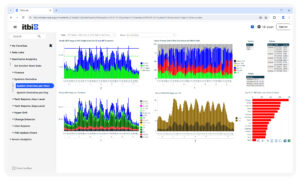
Customization Options for Advanced Users
ITBI™ offers the ability to create custom analyses and personalize ITBI™ user pages. With the BI Advanced or BI Developer Access license, users can generate custom reports using a desktop-based Report Builder client. For those who prefer a more hands-off approach, custom reports can also be requested from the SMT Data ITBI™ expert team. This flexibility supports diverse business needs and enhances user engagement with the data, making ITBI™ a powerful solution for tailored insights.
Standard report coverage:
Mainframe Hardware Configuration Overview
System Performance Overview: WLM (Workload Management) Activities Analysis
Subsystem Performance Analysis:
CICS (Customer Information Control System), DB2 Plan and Package Performance, DDF (Distributed Data Facility) Performance, IMS (Information Management System), WAS (WebSphere Application Server), MQ (Message Queue) Management, zConnect